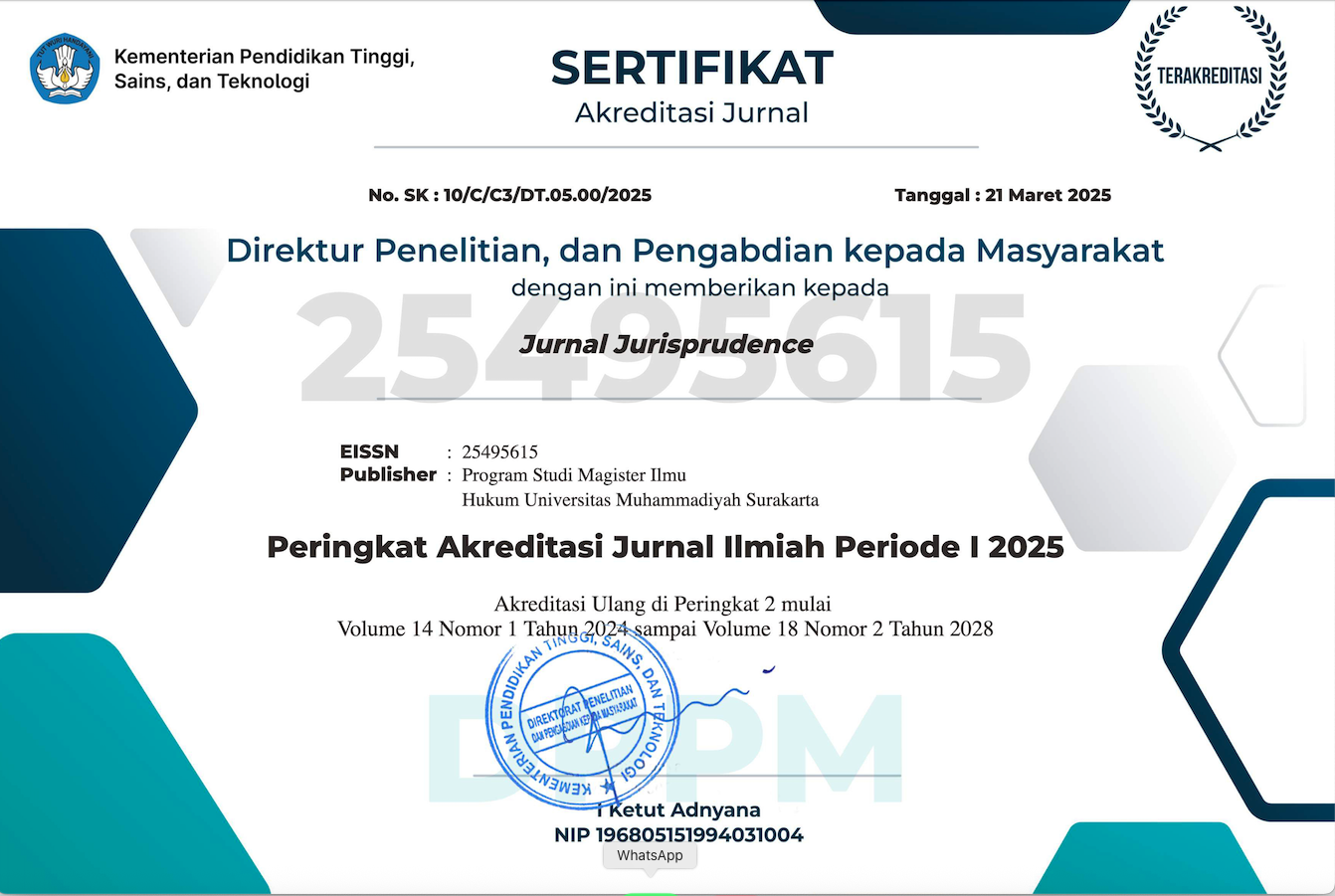Analysis Of Legal Discovery Methods By Judges In Rechterlijk Pardon's Perspective to Solve Criminal Cases
DOI:
https://doi.org/10.23917/jurisprudence.v14i1.4397Keywords:
Legal Discovery, Judge, Rechtlijk Pardon, Penemuan Hukum, HakimAbstract
ABSTRACT
Purpose of the study: This research aims to ascertain the legal discovery process that judges use to assess whether to grant rechtlijk pardon in order to resolve criminal cases, as well as the challenges judges encounter while attempting to do so.
Methodology: Normative legal research was used in this paper. Normative legal research, which is carried out in the literature review in the form of pertinent legal regulations and norms, is a scientific research technique grounded in the logic of jurisprudence (doctrine) to seek truth from a normative perspective.
Results: The study's findings lead to the following conclusions: firstly, judges can perform rechvorming through the use of the construction legal discovery method, which takes the form of legal narrowing or legal refining, while determining rechterlijk pardon. Secondly, in carrying out the revision, the court employed the process of finding construction law based on restorative justice.
Applications of this study: The study gives a more comprehensive understanding analysis, given that the current criminal law formulation policy does not embrace the value of genuine forgiveness by judges. However, judges retain very particular authority in cases where the defendant has been legally and convincingly established to have committed a criminal conduct, but the judge may grant forgiveness without imposing a sentence.
Novelty/Originality of this study: A concrete decision that has become jurisprudence as an implementation of Rechvorming with the discovery of construction law in the form of legal refinement (narrowing of the law) by judges in the perspective of Rechterlijk Pardon is the North-East Jakarta District Court Number 46/Pid/78/UT/Wanita and the North-East Jakarta District Court Decision Number 90/PID/1976/TIM. The Panel of Judges takes into account the seriousness of the offense, the offender's personal circumstances, or the circumstances surrounding the crime at the time it was committed when awarding a rechterlijk pardon. The existence of peace between the parties, justice, and humanity may also be taken into consideration by the judicial panel while deciding whether to prosecute or take no action of parties as an extra option for deciphering rechterlijk pardon.
Keywords: Legal Discovery, Judge, Rechtlijk Pardon
ABSTRAK
Tujuan Penelitian: Penelitian ini bertujuan untuk mengetahui proses penemuan hukum yang digunakan hakim dalam menilai apakah akan memberikan pengampunan hukum (rechtlijk pardon) untuk menyelesaikan kasus pidana serta tantangan yang dihadapi hakim dalam melakukannya.
Metodologi: Penelitian ini menggunakan metode penelitian hukum normatif. Penelitian hukum normatif yang dilakukan dalam bentuk kajian literatur berupa peraturan hukum dan norma yang relevan adalah teknik penelitian ilmiah yang didasarkan pada logika yurisprudensi (doktrin) untuk mencari kebenaran dari perspektif normatif.
Hasil Penelitian:Hasil penelitian menunjukkan beberapa kesimpulan berikut: Pertama, hakim dapat melakukan pembentukan hukum melalui metode penemuan hukum konstruksi yang berupa penyempitan hukum atau pemurnian hukum dalam menentukan rechterlijk pardon. Kedua, dalam melakukan revisi, pengadilan menggunakan proses penemuan hukum konstruksi berdasarkan keadilan restoratif.
Aplikasi Penelitian: Penelitian ini memberikan pemahaman dan analisis yang lebih komprehensif mengingat kebijakan formulasi hukum pidana saat ini tidak mengadopsi nilai pengampunan sejati oleh hakim. Namun, hakim tetap memiliki kewenangan khusus dalam kasus di mana terdakwa secara sah dan meyakinkan terbukti melakukan tindakan pidana tetapi hakim dapat memberikan pengampunan tanpa menjatuhkan hukuman.
Kebaruan/Orisinalitas Penelitian: Keputusan konkret yang telah menjadi yurisprudensi sebagai implementasi Rechvorming dengan penemuan hukum konstruksi dalam bentuk pemurnian hukum (penyempitan hukum) oleh hakim dalam perspektif Rechterlijk Pardon adalah Pengadilan Negeri Jakarta Timur Nomor 46/Pid/78/UT/Wanita dan Putusan Pengadilan Negeri Jakarta Timur Nomor 90/PID/1976/TIM. Majelis Hakim mempertimbangkan keseriusan pelanggaran, keadaan pribadi pelaku, atau keadaan di sekitar kejahatan pada saat itu dilakukan saat memberikan rechterlijk pardon. Keberadaan perdamaian antara pihak-pihak, keadilan, dan kemanusiaan juga dapat dipertimbangkan oleh majelis hakim saat memutuskan untuk menuntut atau tidak melakukan tindakan terhadap pihak-pihak sebagai opsi tambahan untuk menafsirkan rechterlijk pardon.
Kata Kunci: Penemuan Hukum, Hakim, Rechtlijk Pardon
Submitted
Accepted
Published
Issue
Section
License
Copyright (c) 2024 Jurnal Jurisprudence

This work is licensed under a Creative Commons Attribution 4.0 International License.

















